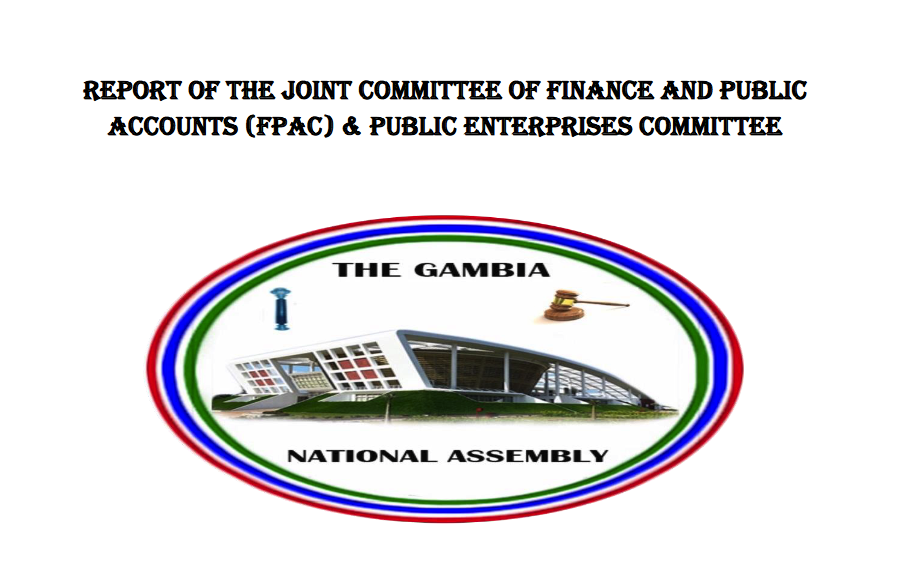Gambiaj.com (BANJUL, The Gambia) – In a country where every dalasi matters and public accountability is often preached more than practiced, the June 2025 report by the Joint Finance and Public Accounts Committee (FPAC) and the Public Enterprises Committee (PEC) into a $30 million petroleum scandal should have been a turning point. Instead, it reads like a case study in how state institutions can be activated to investigate a crime – but carefully calibrated to avoid actually solving it.
At the center of the scandal is Apogee FZC, a foreign oil trader linked to suspicious transactions, unregistered operations, and illicit financial flows that appear to have been laundered through local proxies – Creed Energy and Ultimate Beige Logistics – using sub-accounts opened with Access Bank and Ecobank.
The entire affair – involving forged documents, ghost companies, tax evasion, and untraceable cash withdrawals – seems pulled from a white-collar crime thriller.
But this was no fiction. It happened in The Gambia.
A Cover-Up by Any Other Name and Institutions Complicit by Inaction
Perhaps the most damning revelation in the report is that the Gambia Police Force was instructed to halt its investigation.
According to testimony, the directive came from none other than the former Inspector General of Police – now serving as Minister of Interior. That order, confirmed by several police officials, was not only political interference – it was obstruction of justice.
Aurimas Steiblys, the Lithuanian national representing Apogee FZC and the sole signatory to multiple sub-accounts channeling millions of dollars, was never charged.
His supposed cautionary statement lacks a date, signature, and independent witness – in violation of standard procedure – suggesting intentional obstruction of justice and selective leniency likely benefiting an international actor with local political allies.
He was released on self-bail, with no travel restrictions, no passport seizure, and no follow-up interrogation. When pressed, the police admitted the suspect’s so-called “cautionary statement” lacked basic procedural elements like a date, signature, and witness.
And still, no one in power has been held to account for this extraordinary lapse.
The Financial Intelligence Unit (FIU) did its job – up to a point. It flagged the suspicious accounts, warned of possible kickbacks involving a “top government official,” and linked Apogee’s shadowy transactions to local banks.
But the FIU admitted it never froze the accounts, never pursued Apogee’s foreign links, and got no feedback from the police, GRA, or Central Bank after sharing its findings.
The Gambia Revenue Authority (GRA), for its part, conducted a “Best of Judgement” tax assessment only after being alerted – not proactively.
The Authority then failed to take any enforcement action, didn’t join the ongoing court case effectively, and offered no evidence of recovered revenue. It didn’t even demand transaction records related to offshore remittances.
As for the Central Bank and banking sector regulators? The report reveals that sub-accounts were opened illegally, used as conduits for massive offshore transfers, and approved without proper Know Your Customer (KYC) procedures.
Yet, there’s no record of penalties against the banks — or against their senior officers who greenlit these arrangements.
A Policy Tailored for One
Then there’s the Ministry of Petroleum and Energy, which issued a series of “policy letters” – one of which the Committee later declared fictitious – that mysteriously allowed Apogee FZC to access ullage space at the Gam-Petroleum depot, sidelining local oil marketing companies.
The result? Apogee enjoyed a monopoly over petroleum lifting in the country during the deal period.
Shockingly, this decision bypassed Cabinet approval and violated industry norms. Worse, Gam-Petroleum’s General Manager acted as an agent for Apogee, introducing them to local buyers and facilitating their access to critical infrastructure.
It’s no wonder the Committee deemed his testimony “not credible.”
The National Assembly Committee’s Theatrics of Accountability
Despite the grave allegations involving money laundering, tax evasion, and international transactions, the Committee did not hire independent financial analysts or forensic accountants.
This, in itself, is a missed opportunity to trace illicit financial flows or uncover offshore links involving Apogee FZC.
Meanwhile, the report is extensive – 100 pages of witness statements, document analysis, and institutional assessments.
But the conclusions and recommendations are strikingly tame, considering the evidence. They do not fully reflect the magnitude of institutional breakdowns observed in the inquiry.
Nowhere in the report is there a recommendation for criminal prosecution of the Interior Minister who halted the police investigation. No senior government official is recommended for suspension, dismissal, or even formal investigation.
The recommendations target banks, regulators, and companies, but not political figures or the Minister of Petroleum who authored a fictitious policy letter (MOPE/GOGP/PP/002) without Cabinet approval.
The emphasis, instead, is on vague institutional reforms – better coordination, clearer policies, stronger compliance. All useful. But all beside the point.
Because what this scandal reveals is not a failure of systems. It is a failure of political will. The laws exist.
The institutions exist. The intelligence existed. But once it threatened to rise too high, the entire operation was strategically muffled.
What Justice Demands Amid Disjoint Between Findings and Recommendations
Justice, and real justice in this case, would recommend an immediate prosecution of those who ordered the halting of the police investigation, criminal proceedings against Aurimas Steiblys and any named collaborators, regulatory penalties against Access Bank and Ecobank for their role in enabling illicit accounts, a public release of Apogee’s foreign transactions and beneficiaries, and the immediate suspension of any officials at the Ministry of Petroleum and Gam-Petroleum implicated in the collusion.
But instead, The Gambia is left with a detailed record of wrongdoing and a political elite that appears determined to let it fade into memory.
The Apogee affair will not be the last major scandal in The Gambia. But it could have been a turning point – a moment when the country’s leaders chose to uphold the law, not protect their own. Instead, they chose to protect privilege over principle.
That’s not just a scandal.
That’s a betrayal.










